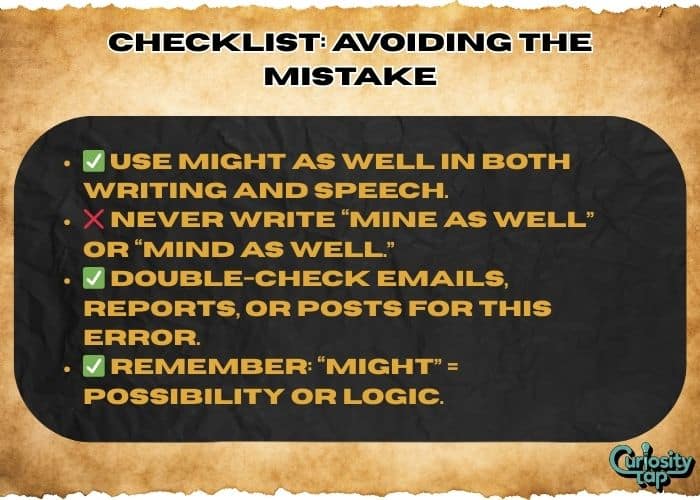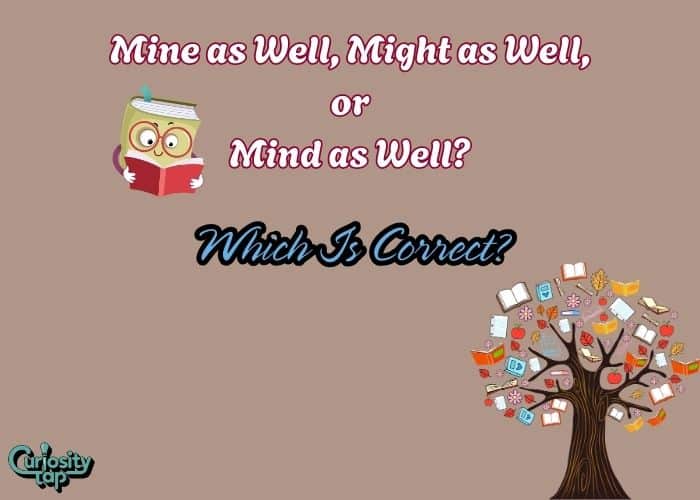Have you ever written or heard someone say “mine as well” or “mind as well” when they actually meant “might as well”? You’re not alone. These phrases sound similar in casual speech, which often causes confusion in writing. But only one of them is grammatically correct.
In this article, we’ll break down the differences, explain why the mistakes happen, and give you practical tools to always choose the right expression.
Why “Might as Well” Is the Correct Phrase
The correct expression is might as well. This phrase is used when suggesting an action that seems logical, reasonable, or harmless because no better alternative exists.
Example in Context
- “We missed the bus, so we might as well walk to the station.”
- “It’s raining outside; we might as well stay in and watch a movie.”
Here, might as well conveys a sense of acceptance or practicality.
Common Mistakes: “Mine as Well” and “Mind as Well”
1. Mine as Well
This is a mistaken phrase. It likely comes from mishearing “might as well.”
- Incorrect: “You’re going to the store? I’ll come with you, mine as well.”
- Correct: “…I’ll come with you, might as well.”
There is no grammatical basis for “mine as well.”
2. Mind as Well
This error occurs because “might” and “mind” sound alike in casual conversation. However, “mind as well” has no meaning in English.
- Incorrect: “You mind as well join us for dinner.”
- Correct: “You might as well join us for dinner.”
Why Do People Confuse These Phrases?
Phonetic Similarity
When spoken quickly, might as well sounds like mine as well or mind as well. This is a classic case of phonetic spelling errors.
Informal Speech Habits
In everyday conversations, pronunciation is often relaxed, leading to misheard expressions. Over time, these errors creep into writing, especially in texts, social media posts, or casual emails.
Real-Life Example: A Common Workplace Mix-Up
Sarah, a new intern at a marketing firm, once sent an email to her team:
“The meeting was canceled, so we mine as well use the time to work on the campaign draft.”
The team chuckled at the error, but her manager later explained that the correct phrase is “might as well.” This gentle correction saved Sarah from repeating the mistake in future professional communications.
This story highlights how minor errors can affect your credibility in formal settings.
Also Read:
Hoodie or Hoody? Choosing The Right Spelling
Of Course or Ofcourse: Correct Spelling Explained
Steam or Steem: What’s The Difference?
Occasion or Ocassion: What’s The Correct Spelling?
Long Term or Long-Term: Right Decision In Writing
Quick Comparison Table
| Phrase | Correct/Incorrect | Meaning | Example (Correct Usage) |
|---|---|---|---|
| Might as well | ✅ Correct | Suggests a reasonable or logical action | “It’s late; we might as well call it a night.” |
| Mine as well | ❌ Incorrect | Misheard version of “might as well” | — |
| Mind as well | ❌ Incorrect | Misheard version of “might as well” | — |

Checklist: Avoiding the Mistake
- ✅ Use might as well in both writing and speech.
- ❌ Never write “mine as well” or “mind as well.”
- ✅ Double-check emails, reports, or posts for this error.
- ✅ Remember: “Might” = possibility or logic.
FAQs
Is “mine as well” ever acceptable in informal English?
No. It’s always considered incorrect, even in casual writing.
Why do so many people write “mine as well”?
Because of how quickly “might as well” is spoken, people misinterpret the sounds.
Can “might as well” be used in formal writing?
Yes, but use it sparingly. It’s suitable for essays, reports, or professional communication.
Are there synonyms for “might as well”?
Yes: may as well, it would be reasonable to, or there’s no harm in.
Is “may as well” the same as “might as well”?
They’re nearly interchangeable, though “might as well” is more common in modern English (Merriam-Webster, 2023).
Pros & Cons of Using “Might as Well”
Pros:
- Widely understood and grammatically correct
- Flexible in both formal and informal contexts
- Adds natural flow to sentences
Cons:
- Can sound casual if overused
- Easily misheard and miswritten
Conclusion
When faced with the choice between mine as well, mind as well, and might as well, the answer is simple: only “might as well” is correct.
Using the wrong version may seem minor, but in professional communication, it can affect your credibility. Mastering small details like this strengthens both your writing and your confidence.
Call to Action
Want to sharpen your English and write successfully every time?
Check out our Grammar Checker Tool and never second-guess your spelling again!
Read our guide on Common English Misspellings to boost your skills even further.
Sources List
Sources:
- Merriam-Webster. (2023). Might as well. https://www.merriam-webster.com/dictionary/might%20as%20well
- Cambridge Dictionary. (2023). Might as well. https://dictionary.cambridge.org/dictionary/english/might-as-well
- Grammarly Blog. (2023). Might as well vs. May as well. https://www.grammarly.com/blog/might-as-well
Read more knowledgeable blogs on Curiosity Tap
Is this article helpful?

Jackson Pearson is a passionate educator and language enthusiast behind the blog Jackson Pearson. With years of experience in teaching and writing, he specializes in simplifying complex grammar rules, breaking down tricky vocabulary, and crafting learning guides that are both engaging and practical. His mission is to help readers boost their English skills whether they’re beginners or brushing up for fluency. Through every article, Jackson brings clarity, structure, and a spark of curiosity to the world of English learning.



